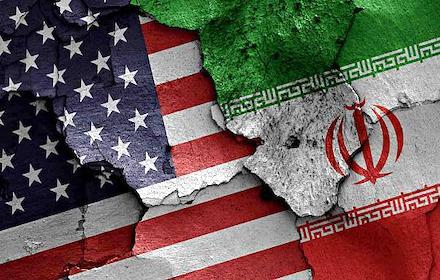www.aljazeerah.info
Opinion Editorials, January 2020
Archives
Mission & Name
Conflict Terminology
Editorials
Gaza Holocaust
Gulf War
Isdood
Islam
News
News Photos
Opinion Editorials
US Foreign Policy (Dr. El-Najjar's Articles)
www.aljazeerah.info
What's Behind the West's Hatred of Iran? By Stuart Littlewood Redress, January 13, 2020 |
 |
 |
|
Mossadeq’s great sin: he “broke the chains of slavery and servitude to colonial interests”. US and Britain are still smarting.
Nobody saw that coming. Trump ordering Qassim Soleimani’s execution, I mean.
Nobody thought even he was quite so stupid.
It follows his last year’s caper when the “cocked and loaded” drama-queen ordered military strikes against Iran’s radar and missile batteries in retaliation for their shooting down of a US spy drone. He changed his mind with only minutes to spare on account of a reminder that such lunacy might actually cost human lives.
Plus the fact that the drone was eight miles from the coast, well inside the 12 nautical miles considered to be Iran’s territorial waters under the UN Convention on the Law of the Sea, and it clearly represented a military threat and provocation. So he had no lawful claim of self-defence that would justify a military attack. The United Nations Charter allows only the use of military force in self-defence after an armed attack or with Security Council approval. So his proposed action would have been illegal as well as unwise, but none of that seemed to enter into his calculations then, or now.
Before that we had Trump’s executive order in August 2018 re-imposing a wide range of sanctions against Iran after pulling the US out of the seven-party nuclear deal for no good reason, a spiteful move that annoyed the European Union and caused all sorts of problems for other nations. And he was going to impose extra sanctions aimed mainly at Iran’s oil industry and foreign financial institutions.
“If the ayatollahs want to get out from under the squeeze,” warned US National Security Adviser John Bolton, “they should come and sit down. The pressure will not relent while the negotiations go on.” To which Iran’s president, Hassan Rouhani, responded: “If you stab someone with a knife and then you say you want talks, then the first thing you have to do is remove the knife.”
United Nations Special Rapporteur Idriss Jazairy described the sanctions as “unjust and harmful… The reimposition of sanctions against Iran after the unilateral withdrawal of the United States from the Iran nuclear deal, which had been unanimously adopted by the Security Council with the support of the US itself, lays bare the illegitimacy of this action.”
The other parties to the nuclear deal – Russia, China, Germany, France, the UK and the EU – vowed to stick with it and continue trading with Iran,with some EU foreign ministers saying Iran was abiding by the agreement and delivering on its goal when Trump withdrew and they deeply regretted the new sanctions. Trump in turn called Iran “a murderous dictatorship that has continued to spread bloodshed, violence and chaos”. The irony of such a remark was, of course, completely lost on him.
I read on 9 January that the EU “will spare no efforts” to keep the nuclear deal with Iran alive, though I doubt if Boris Johnson, passionate Zionist that he is, will be among them.
When it comes to aggression and dishonesty the US has form, and lots of it. Who can forget during the Iran-Iraq war the cruiser USS Vincennes, well inside Iran’s territorial waters, blowing Iran Air Flight 655 to smithereens and killing all 290 passengers and crew on board? The excuse, which didn’t bear examination afterwards, was that they mistook the Airbus A300 for an Iranian F-14 Tomcat manoeuvring to attack.
George H. W. Bush commented on a separate occasion: “I will never apologise for the United States – I don’t care what the facts are… I’m not an apologize-for-America kind of guy.” Trump seems to have caught the same disease. And, from the outside, the White House itself seems home to the sort of “murderous dictatorship” he describes.
The need to continually demonise Iran
When I say the West’s hatred of Iran, I mean primarily the US-UK-Israel axis. Ben Wallace, UK Defence Secretary filling in for Boris Johnson who had absented himself, has told Parliament: “In recent times Iran has felt its intentions are best served through… the use of subversion as a foreign policy tool. It has also shown a total disregard for human rights.” This is amusing coming from the British government and especially a Conservative one which adores Israel, the world’s foremost disregarder of human rights and international law.
Britain and America would like everyone to believe that hostilities with Iran began with the 1979 Islamic revolution. But you have to go back to the early 1950s for the root cause in America’s case, while Iranians have had to endure a whole century of British exploitation and bad behaviour. And the axis want to keep this important slice of history from becoming part of public discourse. Here’s why.
In 1901 William Knox D’Arcy obtained from the Mozaffar al-Din Shah Qajar a 60-year oil concession to three-quarters of the country. The Persian government would receive 16 per cent of the oil company’s annual profits, a rotten deal as the Persians would soon realise.
D’Arcy, with financial support from Glasgow-based Burmah Oil, formed a company and sent an exploration team. Drilling failed to find oil in commercial quantities and by 1908 D’Arcy was almost bankrupt and on the point of giving up when they finally struck it big. The Anglo-Persian Oil Company was up and running and in 1911 completed a pipeline from the oilfield to its new refinery at Abadan.
Just before the outbreak of World War I Winston Churchill, then First Lord of the Admiralty, wished to convert the British fleet from coal. To secure a reliable oil source the British government took a major shareholding in Anglo-Persian.
In the 1920s and 1930s the company profited hugely from paying the Persians a miserly 16 per cent and refusing to renegotiate terms. An angry Persia eventually cancelled the D’Arcy agreement and the matter ended up at the Court of International Justice in The Hague. A new agreement in 1933 provided Anglo-Persian with a fresh 60-year concession but on a smaller area. The terms were an improvement but still didn’t amount to a square deal for the Persians.
In 1935 Persia became known internationally by its other name, Iran, and Anglo-Persian changed to Anglo-Iranian Oil. By 1950 Abadan was the biggest oil refinery in the world and the British government, with its 51 per cent holding, had effectively colonised part of southern Iran.
Iran’s tiny share of the profits had long soured relations and so did the company’s treatment of its oil workers. Six thousand went on strike in 1946 and the dispute was violently put down with 200 dead or injured. In 1951 while Aramco was sharing profits with the Saudis on a 50/50 basis, Anglo-Iranian declared £40 million profit after tax and handed Iran only £7 million.
Iran by now wanted economic and political independence and an end to poverty. Calls for nationalisation could not be ignored. In March 1951 the Majlis and Senate voted to nationalise Anglo-Iranian, which had controlled Iran’s oil industry since 1913 under terms frankly unfavourable to the host country. Social reformer Dr Mohammad Mossadeq was named prime minister by a 79 to 12 majority and promptly carried out his government’s wishes, cancelling Anglo-Iranian’s oil concession and expropriating its assets.
His explanation was perfectly reasonable…
For this he would be removed in a coup by MI5 and the CIA, imprisoned for three years then put under house arrest until his death.
Britain was determined to bring about regime change, so it orchestrated a world-wide boycott of Iranian oil, froze Iran’s sterling assets and threatened legal action against anyone purchasing oil produced in the formerly British-controlled refineries. The Iranian economy was soon in ruins. Sounds familiar, doesn’t it?
America was reluctant at first to join Britain’s destructive game but Churchill (prime minister at this time) let it be known that Mossadeq was turning communist and pushing Iran into Russia’s arms at a time when Cold War anxiety was high. That was enough to bring America’s new president, Dwight Eisenhower, on board and plotting with Britain to bring Mossadeq down.
Chief of the CIA’s Near East and Africa division, Kermit Roosevelt Jr, played the lead in a nasty game of provocation, mayhem and deception. Shah Mohammad Reza Pahlavi signed two decrees, one dismissing Mossadeq and the other nominating the CIA’s choice, General Fazlollah Zahedi, as prime minister. These decrees were written as dictated by the CIA.
In August 1953, when it was judged safe for him to do so, the Shah returned to take over. Mossadeq was arrested, tried, and convicted of treason by the Shah’s military court. He remarked:
His supporters were rounded up, imprisoned, tortured or executed. Zahedi’s new government reached an agreement with foreign oil companies to form a consortium to restore the flow of Iranian oil, awarding the US and Great Britain the lion’s share – 40 per cent going to Anglo-Iranian. The consortium agreed to split profits on a 50-50 basis with Iran but refused to open its books to Iranian auditors or allow Iranians to sit on the board.
The US massively funded the Shah’s government, including his army and his hated secret police force, SAVAK. Anglo-Iranian changed its name to British Petroleum in 1954. Mossadeq died on 5 March 1967.
The CIA-engineered coup that toppled Mossadeq, reinstated the Shah and let the American oil companies in, was the final straw for the Iranians. The British-American conspiracy backfired spectacularly 25 years later with the Islamic revolution of 1978/9, the humiliating 444-day hostage crisis in the American embassy and a tragically botched rescue mission.
Smoldering resentment for at least 70 years
And all this happened before the Iran-Iraq war when the West, especially the US, helped Iraq develop its armed forces and chemical weapons arsenal which were used against Iran. The US, and eventually Britain, leaned strongly towards Saddam in that conflict and the alliance enabled Saddam to more easily acquire or develop forbidden chemical and biological weapons. At least 100,000 Iranians fell victim to them.
This is how John King, writing in 2003, summed it up:
And while Iranian casualties were at their highest as a result of US chemical and biological war crimes, what was Trump doing? He was busy acquiring the Mar-a-Lago estate in Palm Beach, Trump Castle, his Taj-Mahal casino, the Plaza Hotel in Manhattan – oh, and he was refitting his super-yacht Trump Princess. What does he know, understand or care about Iran and the Iranian people today?
On the British side our prime minister, Boris Johnson, was at Oxford carousing with fellow Etonians at the Bullingdon Club. What does he know or care?
The present Iranian regime, like many others, may not be entirely to the West’s liking but neither was Mossadeq’s fledgeling democracy nearly 70 years ago. If Britain and America had played fair and allowed the Iranians to determine their own future instead of using economic terrorism to bring the country to its knees, Iran might have been “the only democracy in the Middle East” today.
So hush! Don’t even mention the M-word: MOSSADEQ.
https://www.redressonline.com/2020/01/whats-behind-the-wests-hatred-of-iran/
***
Share the link of this article with your facebook friends
|
|
|
|
||
|
||||||


